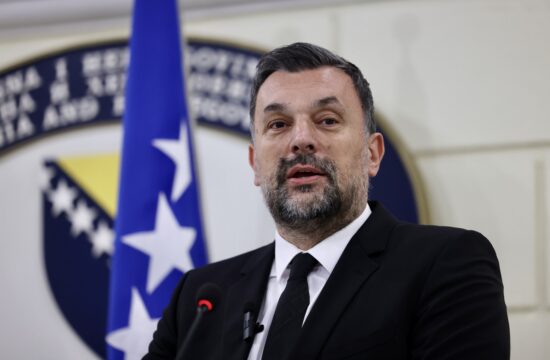
Russian Foreign Minister Sergey Lavrov has said that Russia's policy towards Bosnia is clear and consistent, based on the view that the country's stability is connected with respect for the Dayton Accords and internal dialogue as a way of seeking solutions, without external interference.
Lavrov made the statement at a news conference he held in Sarajevo on Tuesday with Bosnia and Herzegovina Foreign Minister Bisera Turkovic, with whom he held talks at which they agreed on a plan for bilateral diplomatic consultations for the next two years.
The talks between the two ministers were overshadowed by a scandal caused by Lavrov's statements made on Monday, in which he brought into question the possibility of Bosnia and Herzegovina's accession to NATO and called for urgently shutting down the Office of the High Representative (OHR) in the country.
This prompted Bosnia and Herzegovina (BiH) Presidency members Zeljko Komsic and Sefik Dzaferovic to refuse to meet with Lavrov so he met in the Presidency offices only with Milorad Dodik, the incumbent Serb chairman of the BiH Presidency with whom he had already held separate talks in East Sarajevo on Monday.
Lavrov made no special comment on the scandal that cast a shadow on his visit to Bosnia and Herzegovina, repeating only at the news conference that Russia respected Bosnia and Herzegovina's sovereignty, called for the consistent implementation of the Dayton agreement and opposed its possible revision.
He noted that it was Moscow's view that the only solution for Bosnia and Herzegovina was internal dialogue and agreement based on compromise.
Despite Komsic's and Dzaferovic's objections, Lavrov repeated his statement of Monday that the role of the High Representative in Bosnia and Herzegovina had been exhausted and that his term should end while Bosnia and Herzegovina should continue functioning as an independent country.
Turkovic, too, avoided direct comment on the messages to Russia sent by Dzaferovic's and Komsic's boycott of Lavrov.
She said that her meeting with the Russian minister was “constructive and open” and that they established that the two countries’ relations were good and that there was room for their improvement, notably on the economic front.
“I hope… there will be an improvement in the coming period,” she said.
Turkovic added that Bosnia and Herzegovina welcomed Russia's commitment to respecting Bosnia and Herzegovina's territorial integrity and sovereignty as defined by the Dayton peace agreement and expected Russia to help in its progress “based on documents supported at the state level by elected representatives.”
“We should respect one another and respect the Dayton agreement,” she said, recalling that the Dayton agreement guaranteed equal rights for all BiH citizens regardless of their place of residence, as well as respect for all court rulings on the entire BiH territory.
Using diplomatic language, she said that the reason for current problems in the country were “tree different views” of the country's future, including its path to Euro-Atlantic associations, and added that the only solution to that was a compromise.
In that context she mentioned problems regarding integration with NATO and the future of the OHR, for which, she stressed, a middle-road policy was required with which all peoples in Bosnia and Herzegovina would be satisfied.
By meeting with Turkovic Lavrov ended his two-day official visit to Bosnia and Herzegovina and left for Belgrade, the next stop of his regional tour.




